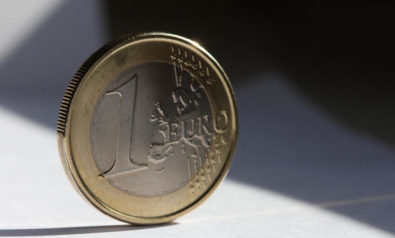Historical context suggests a Greek exit from the Euro would restore competitiveness faster and with less suffering than the current Troika plan of austerity and internal devaluation.
Note: This article’s co-author has asked to publish anonymously, and Fair Observer respects the author’s right to privacy.
Under the current EU – IMF austerity programme Greece is in danger of falling into an economic depression the likes of which has rarely been seen in a Western country in the post war era. The country has already suffered over a 15% drop in GDP since the start of the recession, and this looks set to fall further still. Unemployment has risen to a record high of over 20% by the end of 2011, with youth unemployment over 50%. In the eyes of EU-IMF policy-makers this is necessary pain in order to achieve the wage cuts and productivity gains that will restore Greek competitiveness whilst maintaining the Euro (what economists call ‘internal devaluation’). However, after nearly five years of severe recession with high unemployment there is little sign that internal devaluation to restore competitiveness is being achieved.
Given the apparent disappointing effects of the European Commission / ECB / IMF (hereon ‘Troika’) programme, alternative strategies must be examined in order to hasten the relief of suffering for the Greek people. This article will therefore assess the current Troika internal devaluation option against the alternative of a Greek Euro exit, undertaking the analysis from a Greek perspective. Further work should explore policy options that would maintain the Euro but are outside the current austerity / internal devaluation approach. However, such alternatives appear politically unfeasible in the short to medium term, hence at the moment it is appropriate to simply assess the current Troika plan against the clear alternative of Euro exit..
What Happened to Greece?
What has happened to Greece is very similar to other episodes of currency crises that have most frequently occurred in recent times in an emerging market context. Such crises tend to be preceded by large inflows of foreign capital, profligate or ‘pro-cyclical’ fiscal policy, and real exchange rate appreciations.
Having joined the euro, Greece gained access to international funding at generous interest rates in an environment where an Asian savings glut made liquidity plentiful. The Greeks, in particular the Greek public sector, gorged on this cheap credit leading to a boom during which twin current account and budget deficits went unchecked. Macroeconomic control of the economy was loose and the competitiveness of the economy was allowed to diminish, with wages increasing dramatically beyond any increases in productivity.
The party had to stop at some point. In 2009 the incoming Socialist Government revised up estimates of the previous year’s budget deficit from 6.7% to 12.7%. Shortly afterwards Greek sovereign debt was downgraded by rating agencies, yields swiftly increased, and access to foreign capital evaporated.
Where Are We Now – The Troika Plan
Greece has now taken loans from the Troika – firstly of €110 billion in 2010, then a further €130bn in October 2011 – to cover maturing sovereign debt. Furthermore Greece has (with the help of political pressure from Troika authorities) negotiated a partial restructuring of its debt with creditors – essentially defaulting on a portion of these obligations. In return for this assistance the Troika has imposed a strict forward programme of fiscal austerity on Greece which will slash public spending, increase taxes, and reduce public sector wages and employment. In 2010-2011 the Greek Government adopted measures to reduce spending by 8.7% of GDP, committed to reduce Government employment by 150,000 workers, and followed up earlier this year by cutting the minimum wage by 22% (32% for under 25s).
The Troika strategy is designed to achieve an internal devaluation whereby competitiveness and prosperity is slowly restored by prices and wages being forced down through a period of austerity and unemployment. However, despite an unemployment rate over 20%, thus far this strategy is not working. The IMF have found that the Real Effective Exchange Rate was still higher in 2010 than in 2006, and this did not change substantially in 2011. Labour costs fell in 2011, but these modest gains were largely eliminated by an appreciation in the euro during the first part of that year. Nor are public debt levels as a proportion of GDP going down substantially at the moment as steep falls in GDP levels are offsetting the impact of spending cuts and tax increases. Given these headwinds, internal devaluation is way behind the Troika’s expectations. Indeed, given the amount of adjustment that is still required by Greece it may require a self-defeating, full-blown economic depression in order to ‘work’.
History Suggests Greece is Fighting a Losing Battle
Evidence from previous real appreciations suggests that the odds of a successful internal devaluation are low. A 1999 book by two Brazilian academics found that when real exchange rates appreciate more than 15%, it is unusual for a correction via an internal devaluation (i.e., whilst maintaining a fixed exchange rate). For large appreciations of between 25-30% a smooth adjustment through internal deflation was achieved in only 9% of cases.
According to one estimate, Greece’s real exchange rate was 20% overvalued in 2010. Therefore, it is rare for countries in Greece’s position to successfully restore competitiveness through an internal devaluation. Clearly it is more difficult for Greece to exit monetary union than it has been for countries that have merely abandoned currency pegs. Nonetheless this evidence suggests that the option of a Greek Euro exit must be taken seriously as a possibility.
The Argentina Experience May Prove Instructive
As recent CEPR work has highlighted, Argentina also tried an internal devaluation to correct its uncompetitive real exchange rate in the late twentieth century. For 3.5 years IMF and Argentine policy-makers imposed tight monetary and fiscal policy in an attempt to restore competitiveness whilst maintaining its currency peg. Ultimately this failed to restore prosperity, and so Argentina changed course – defaulting on its debt in December 2001, and abandoning its fixed exchange rate few weeks later. In the short run this caused significant pain with a collapse in the banking system and a deepening of the financial crisis. The GDP loss was 5% in the first quarter of 2002. However, the GDP decline lasted only a single quarter, and after 3 years it was back at pre-crisis level. Two years later even GDP caught up with its long-term trend level, correcting for the lost growth during the crisis.
Why did Argentina do so well? Obviously, exports increased as they became cheaper. But this was not the main force as exports contributed only 12% of Argentinian growth in the expansion of 2002-8. Most of the new demand came from domestic consumption – as newly expensive imports were substituted by local production – and, later, investment.
Under a Euro exit, Greece would also gain from increased export demand. Greek exports are actually twice as high as a proportion of GDP than they were in Argentina in 2001. These exports would increase after a devaluation, and moreover each Euro earned from these exports would buy more internally in the devalued Drachma.
One could even say that Greece is in a better place to exit its fixed exchange rate and default its debt than Argentina was. First, much more of his sovereign debt is held by foreigners as compared to Argentina, which will protect domestic agents from the damage of redenomination. Second, the prospects of a return to private markets for investment might be better for a post-Euro Greece than they were for Argentina in 2002. There are currently many countries with reserves in search of a fair return and fewer attractive havens than existed in 2002.
Addressing Arguments Against Exit
Clearly there are also risks involved with Greece exiting the Euro. Below is a list of potential problems along with some analysis on how seriously they should factor into decision-making.
- Greek Euro denominated debt becomes more difficult to repay. This would be true as Greece’s revenues would now be in devalued Drachma. However, the reality is that Greece would not pay this debt, as Argentina did not repay 2/3 of its debt when it defaulted.
- Following exit and default, Greece will be excluded from financial markets. Yes, it is likely that creditors will be wary of lending to Greece in the immediate aftermath of its Euro exit. This may not be any different to the current situation though, as Greece is already excluded and estimates on when Greece will regain access to private capital markets are being pushed back quarter by quarter. In addition, empirical studies show that the average exclusion times from markets for defaulting sovereign is not that long – approximately 4.5 years over 1980-2000, falling to 2 years during the latter decade. The exclusion time for Greece may actually be shorter in a Euro exit / default scenario than under the current strategy, if exit and default restores competitiveness, growth and debt sustainability more quickly.
- Greek reintroduction of the Drachma will cause chaos. Yes, Greece will need to reintroduce its own currency were it to leave the Euro. This has not been done before, and there will be logistical challenges and transitional legal costs as redenomination to prices and contracts are implemented. Given the size of the economic stakes at play, we do not see these transitional logistical challenges as being pivotal to decision making. In terms of economic fundamentals, Greek Euro exit is no different to previous example of countries abandoning a currency peg.
Conclusion: Exit Better Than Current Menu
The exit and default option is a difficult decision for Greek politicians and it comes with the serious risks noted above. In addition, the success of this strategy would depend heavily on the skill of the Greek authorities in managing the post-exit economy. Given short-term political time-horizons and the short-term pain that would come with a Euro exit, Greek politicians may find it easier to continue accepting the conditions of the Troika.
However, the current Troika programme appears to be failing and risks creating an economic cataclysm for Greece. Austerity and unemployment have yet to make any real progress in restoring competitiveness. Other social indicators are also extremely concerning: Lancet reports show suicides rising 40% in 2010-11, violence and homicide nearly doubling between 2007-09, and HIV infections up 52%.
In conclusion, whilst exit will cost Greece in the short run, it is unlikely that these costs would be bigger than the many years of recession, high unemployment and social strife that the Troika plan is offering at the moment. It seems that a Euro exit to restore competitiveness, and a more comprehensive default on outstanding debt would be a better option for Greece than what is currently on the table.
The views expressed in this article are the authors’ own and do not necessarily reflect Fair Observer’s editorial policy.
Support Fair Observer
We rely on your support for our independence, diversity and quality.
For more than 10 years, Fair Observer has been free, fair and independent. No billionaire owns us, no advertisers control us. We are a reader-supported nonprofit. Unlike many other publications, we keep our content free for readers regardless of where they live or whether they can afford to pay. We have no paywalls and no ads.
In the post-truth era of fake news, echo chambers and filter bubbles, we publish a plurality of perspectives from around the world. Anyone can publish with us, but everyone goes through a rigorous editorial process. So, you get fact-checked, well-reasoned content instead of noise.
We publish 2,500+ voices from 90+ countries. We also conduct education and training programs
on subjects ranging from digital media and journalism to writing and critical thinking. This
doesn’t come cheap. Servers, editors, trainers and web developers cost
money.
Please consider supporting us on a regular basis as a recurring donor or a
sustaining member.
Will you support FO’s journalism?
We rely on your support for our independence, diversity and quality.








Comment